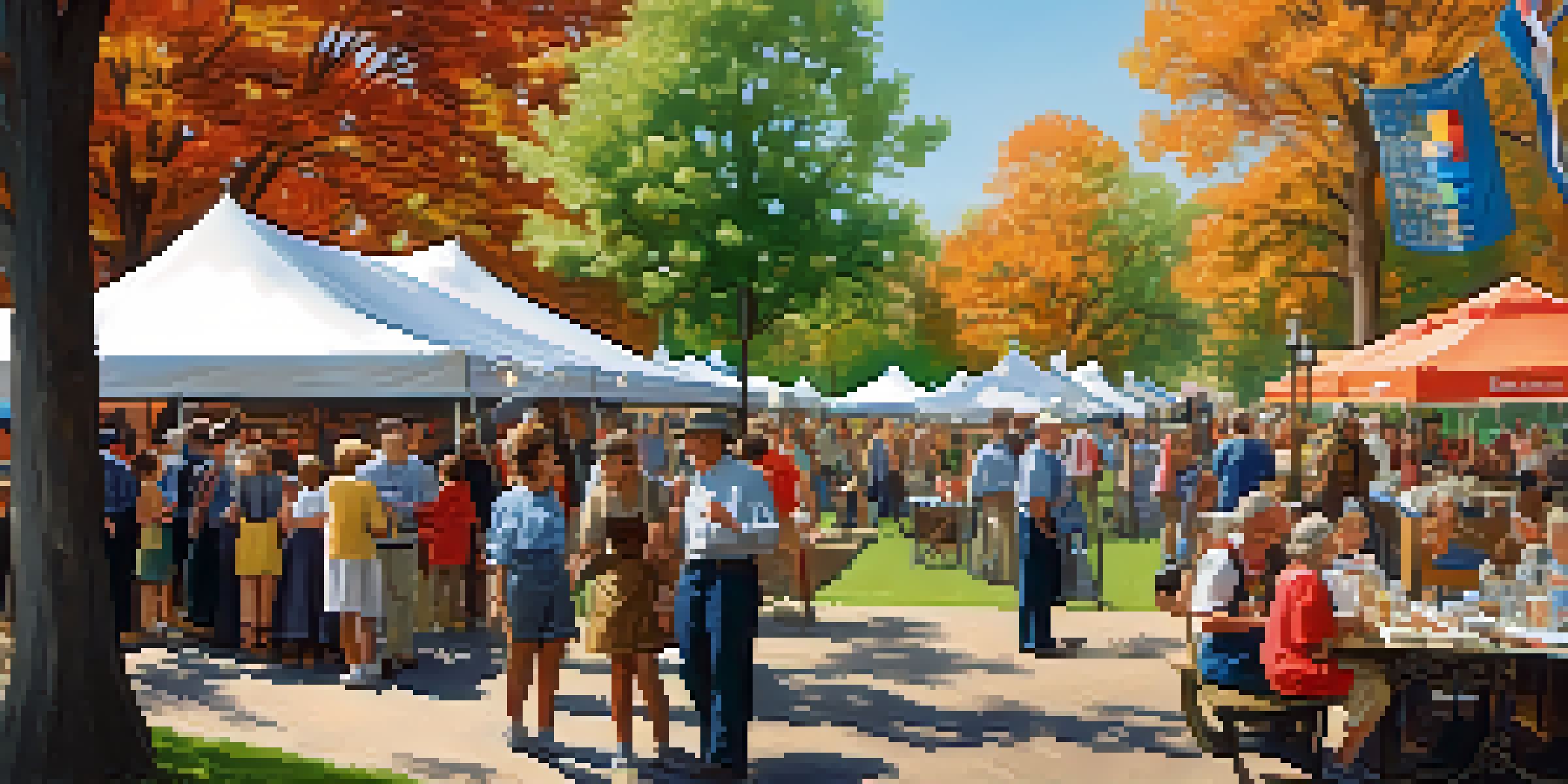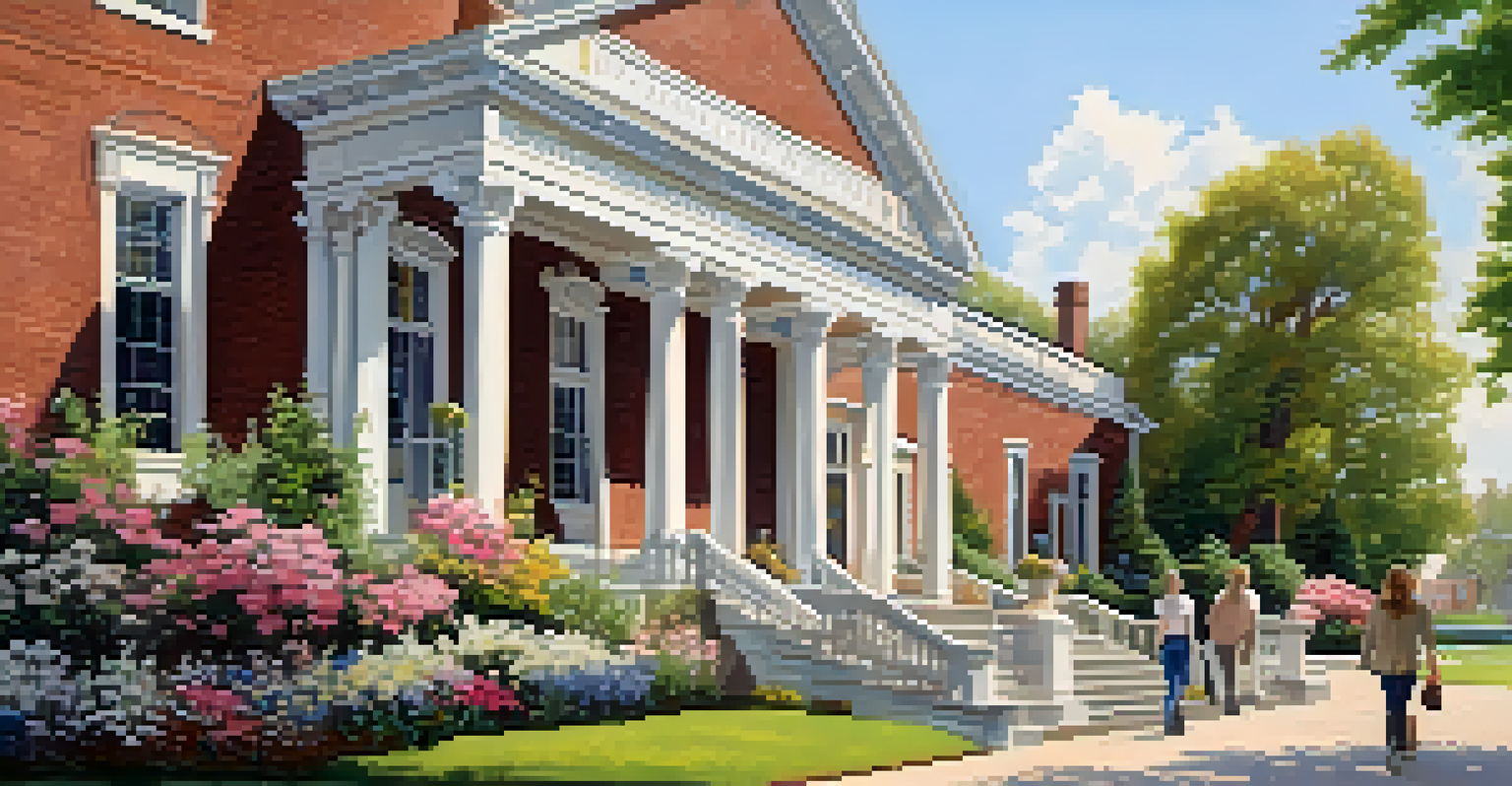Engaging with Historical Societies: Volunteering Opportunities

Understanding the Role of Historical Societies
Historical societies are organizations dedicated to preserving local history and culture. They often manage museums, archives, and educational programs, making them vital for community engagement. By participating in these societies, volunteers can contribute to the preservation of their heritage while fostering a love for history in others.
History is not a burden on the memory but an illumination of the soul.
These societies serve as custodians of artifacts, documents, and stories that might otherwise be forgotten. Volunteers help maintain these collections, ensuring that future generations have access to their local history. This role not only strengthens community ties but also enriches the personal growth of those involved.
Engaging with historical societies allows individuals to connect with like-minded people who share a passion for history. This can lead to friendships, networking opportunities, and a deeper appreciation for one's community. It's a rewarding avenue for anyone looking to make a meaningful impact.
Types of Volunteering Opportunities Available
Volunteering with historical societies can take many forms, from guiding tours to organizing events. Some volunteers may find themselves cataloging artifacts, while others might assist in educational outreach programs aimed at schools. Each role plays a crucial part in keeping the society vibrant and accessible to the public.

You might also get involved in research projects, helping to uncover and document local histories that deserve recognition. This could include anything from interviewing elders to transcribing old records. Such activities not only enhance your research skills but also deepen your understanding of the past.
Preserving Local History Matters
Historical societies play a crucial role in safeguarding community heritage through the preservation of artifacts and stories.
Additionally, there are often opportunities for volunteers to participate in fundraising events or marketing initiatives. This allows individuals to contribute their skills while also learning how non-profits operate. Such experiences can be invaluable for personal and professional development.
Benefits of Volunteering at Historical Societies
Volunteering at historical societies offers numerous benefits, both personal and professional. One significant advantage is the chance to learn more about local history, which can be incredibly enriching. This newfound knowledge can help you appreciate your community on a deeper level, fostering a sense of pride and belonging.
Preservation is a form of activism. It’s about protecting the places that tell our stories.
Moreover, volunteering provides an opportunity to develop new skills. Whether it’s public speaking during guided tours or digital skills while managing archives, these experiences can enhance your resume and career prospects. Employers often value the dedication and initiative shown through volunteer work.
Finally, the social aspect of volunteering can’t be overlooked. You'll likely meet diverse individuals who share your interests, leading to lasting friendships and connections. This sense of community can be uplifting and greatly enhance your overall volunteering experience.
How to Get Involved: Steps to Start Volunteering
Getting involved with a historical society is easier than you might think! Start by researching local historical societies in your area to understand their missions and volunteer needs. Many societies have websites or social media pages that outline available opportunities and how you can get involved.
Once you’ve identified a society that resonates with you, reach out to their volunteer coordinator. This is typically a friendly person who can guide you through the application process and help match your interests with their needs. Don't hesitate to ask questions about what the volunteer roles entail.
Diverse Volunteer Opportunities
Volunteers can engage in various roles, from guiding tours to managing archives, each contributing to the society's mission.
Finally, attend any orientation or training sessions offered. These will equip you with the knowledge and skills necessary to be effective in your role. Plus, it’s a great chance to meet fellow volunteers and start building connections right away!
Success Stories from Volunteers
Many volunteers have gone on to share inspiring stories about their experiences with historical societies. For instance, one volunteer started as a tour guide and eventually became a member of the board, influencing important decisions about local history preservation. Their journey illustrates how volunteering can open unexpected doors.
Another volunteer used their skills in digital marketing to help a society enhance its online presence. As a result, attendance at events soared, and more community members became engaged with local history. This highlights how diverse skills can be utilized for the greater good in historical societies.
Lastly, countless volunteers report deep personal satisfaction from connecting with local history and people. These stories often emphasize the joy of learning and sharing knowledge, proving that volunteering can be a fulfilling and transformative experience.
Challenges Faced by Historical Societies
While historical societies play a critical role in preserving heritage, they often face significant challenges. Funding can be a major hurdle, as many rely on donations, grants, and volunteer support. This can limit their ability to maintain collections, host events, or expand educational programs.
Additionally, attracting a new generation of volunteers can be difficult. Many societies find themselves competing with a range of activities for people's time and attention. It's essential for these organizations to engage younger audiences and demonstrate the value of preserving local history.
Volunteering Enhances Skills and Community
Participating in historical societies not only fosters personal growth and new skills but also builds lasting friendships and community ties.
Finally, historical societies must also navigate the complexities of modern technology. Digitizing collections and maintaining an online presence are crucial for accessibility, but these tasks can be daunting without the right skills or resources. Volunteers can play a vital role in bridging these gaps, bringing fresh ideas and energy.
The Future of Historical Societies and Volunteering
As we look to the future, historical societies are evolving to meet the challenges of a changing world. Many are embracing technology and social media to engage new audiences and raise awareness about local history. This shift opens up exciting opportunities for volunteers to contribute in innovative ways.
Moreover, the trend towards community involvement is growing stronger. More people recognize the value of preserving history, leading to a surge in volunteer interest. Societies that adapt to these changes will not only thrive but also continue to inspire future generations.

Ultimately, the future of historical societies hinges on the passion and commitment of volunteers. By stepping up to support these vital organizations, you can help ensure that the stories of the past are preserved and celebrated for years to come.